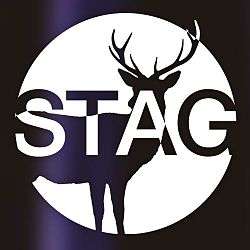Student Theatre at Glasgow
|
STaG logo | |
| Abbreviation | STaG |
|---|---|
| Established | 1994 as Student Theatre at Glasgow |
| Location | |
Membership | ~ 200 |
| Website |
studenttheatreatglasgow |
Formerly called | Glasgow University Theatre (GUT), Glasgow University Drama Society (GUDS), Glasgow University Dramatic Club |
Student Theatre at Glasgow (STaG) is a student-run theatre society based in the University of Glasgow, which aims to produce a variety of theatre productions each academic semester, as well as offer opportunities both to students and non-Glasgow University students to participate.
History
The society dates back to at least 1994, when it is recorded changing its name from Glasgow University Theatre to the current name of Student Theatre at Glasgow. Many differently named theatre societies have existed in Glasgow University in the past, however it is unclear whether these were different societies or whether they are earlier names for STaG.[1] The earliest record of a drama society at Glasgow University was in 1922, when theatre director A. Parry Gunn produced Antigone with members of the Glasgow University Dramatic Club participating in the chorus, to an audience of 2000 people. [2] In 1957, the Glasgow University Dramatic Society sent plays to larger theatre festivals, such as the National Community Drama Festival and the Edinburgh Fringe,[3] and in 1974 Glasgow University Student Theatre Group was recorded to have campaigned for the university to have its own theatre.[4]
Since the 1990s, STaG has resided in its own room on the Glasgow University campus, initially on Hillhead Street, but has since 2000 been located at 62 Oakfield Avenue. The room is maintained by STaG members, and is the base for workshops, rehearsals and socials. The area includes backstage and tech storage, and is adjacent to The Cecilian Society rooms.
The society has an eclectic past in terms of plays produced, ranging from Shakespeare plays such as Macbeth and A Midsummer Night's Dream in 2014, to modern classics like A Streetcar Named Desire in 2013, to contemporary plays such as Jez Butterworth's "Jerusalem".
Structure
The direction and interests of STaG are maintained and upheld by the STaG board, which is elected annually by the membership at the end of the spring semester. The board consists of sixteen different positions, and hold weekly meetings. While STaG is not directly connected to the University of Glasgow, it is affiliated with the SRC, which also awards grants to aid STaG in its productions; STaG is also affiliated with the two student unions, the QMU and the GUU. Despite receiving partial funding from the SRC, STaG relies heavily on revenue from ticket sales and fundraisers.
Activities
Every year STaG puts on two large-scale mainstage performances in public theatres.[5] Previously the mainstage performances were held in the Gilmorehill G12 theatre on the Glasgow University campus, until the G12 commercial unit ceased activity in 2010. This led to STAG staging performances in larger venues, such as the Oran Mor in 2014 and the Art School in 2015. Typically the STaG mainstage productions will be the most ambitious of the semester.
In addition to its two mainstage performances, STaG puts on one Open Slot production each semester, which are smaller scale projects with a faster turn-around time, and tend to be more experimental, or devised in nature.[6] A number of these pieces have been site-specific, such as "The Last Stop", held at the Riverside Museum, or "They Heard Me Singing" at the Poetry Club. Both the Mainstage and the Open Slot are selected through proposals from STAG members, which is one of the ways in which STaG offers directing and writing opportunities to its membership.
STaG also runs two theatre festivals each year. STAG Nights is usually held in November, and consists of several nights of 20-minute plays and installations, centred on a general festival theme. Past themes have included Cabaret, Welcome back to Childhood, and Magic.[7] The festival was first held in 2000, celebrating its tenth anniversary in 2010.[8] The New Works Festival is normally held in February, and consists of three plays of around 50 minutes in length, and three plays of 20 minutes. Each of the plays is an original production that is written or devised by members of STaG. A panel of four judges from the theatre industry watch all plays and pick a winner from the 50 minute plays, which is rewarded with a two-week run at the Edinburgh Festival Fringe.[5] The festival was originally called the New Writing Festival, and was begun in 2007.[9] Each of the plays for the festivals is selected by a committee headed by the festival director.
At the beginning of every academic year, STaG organises New Talent's Night, which is the only production where acting participation is guaranteed, usually amassing a performing group of 50-75 actors. All other acting opportunities are offered through open auditions.
As well as putting on theatrical productions, the society also organises a variety of social events for its members, including monthly society socials and an annual ball.[10] STAG also provides workshops relating to different aspects of theatre, including a writing, a directing, and a backstage workshop, led by both active STaG members as well as visiting theatre professionals.[11]
STAG enjoys strong ties to the Cecilian Society, a musical theatre society also based in Glasgow University.
References
- ↑ "Student Theatre at Glasgow: History". Retrieved 2013-03-08.
- ↑ http://www.bournemouthecho.co.uk/news/features/snapshotsofthepast/10433375.Civilian_war_dead__Bournemouth_bombings_of_23_May_1943/
- ↑ http://studenttheatreatglasgow.com/archive/
- ↑ Glasgow University Guardian, January 24th 1985
- 1 2 "Student Theatre at Glasgow: About STAG". Retrieved 2013-03-08.
- ↑ http://studenttheatreatglasgow.com/about/
- ↑ http://studenttheatreatglasgow.com/past/
- ↑ "STAG Nights 2010: Boom and Bust". Retrieved 2013-03-08.
- ↑ "New Writing Festival". Retrieved 2013-03-08.
- ↑ "Student Theatre at Glasgow: Socials". Retrieved 2013-03-08.
- ↑ "Student Theatre at Glasgow: Write/Direct". Retrieved 2013-03-08.

